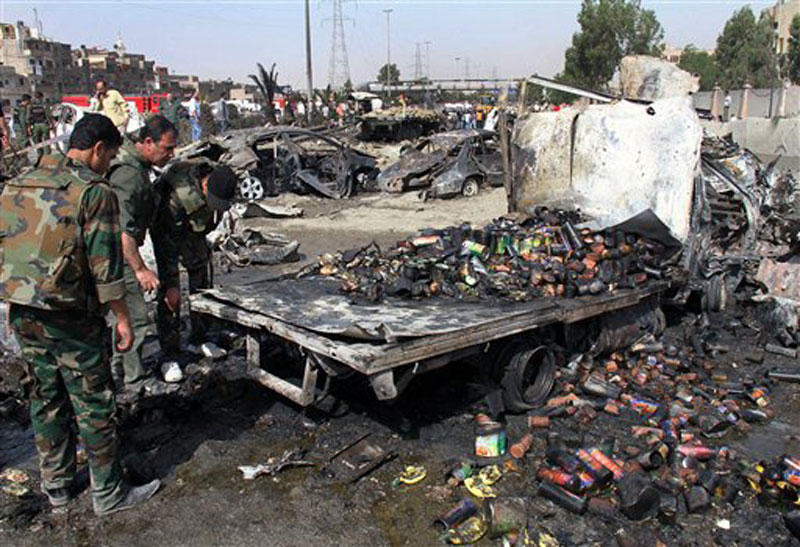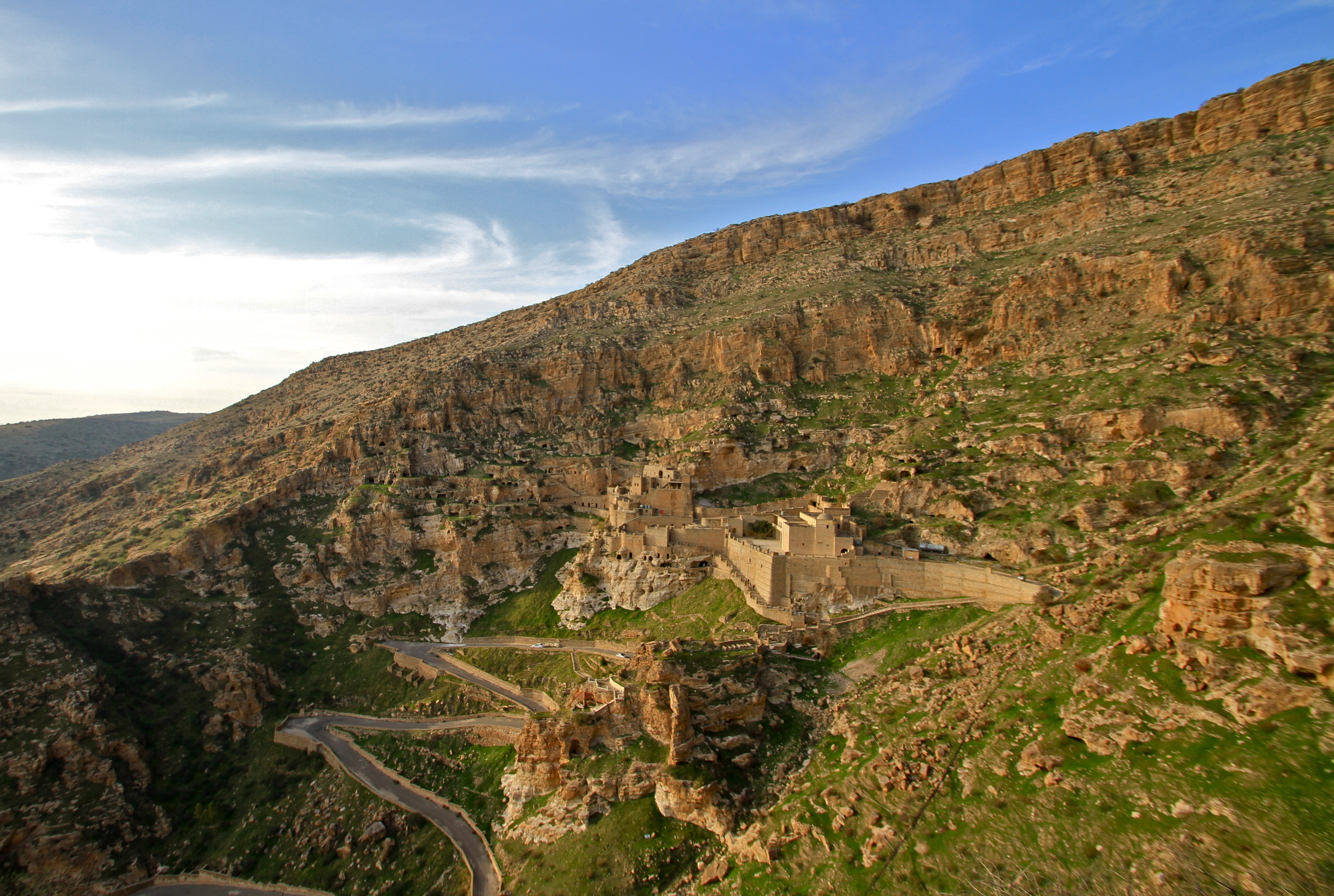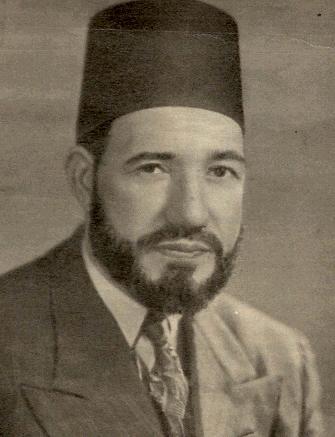[captionpix align=”left” theme=”elegant” width=”320″ imgsrc=”http://www.csmonitor.com/var/ezflow_site/storage/images/media/content/2012/0511-du-damascus-bombings-prompt-warnings/12532119-1-eng-US/0511-DU-damascus-bombings-prompt-warnings_full_600.jpg” captiontext=”Aftermath of twin truck bombing in Damascus last Thursday”]
Damascus was witness last week to a massive car bombing that claimed the lives of 55 people and injured hundreds more. The Syrian government was quick to blame “foreign backed militants” for the carnage, echoing previous statements against operations carried out by the Free Syrian Army (FSA). Leaders of the main rebel group quickly denounced the attacks and pointed the finger at the al-Assad regime. Propaganda emanating from both sides has until this most recent event, clouded discussion over the possible infiltration of jihadist elements into Syria.
A Lack of Dialogue
As Al-Jazeera’s Laurence Lee asked the most pertinent question, “…would the leaders of the Free Syrian Army actually want to do something like this? Does it really sound credible that the government would do it to its own people in the presence of the United Nations monitors?” If not the FSA or the al-Assad regime, who is behind these insurgency-style attacks? Previous episodes of violence may shed some light on who is responsible for these blatant criminal acts. Suicide and car bombings in the country’s capital and flashpoint areas have resulted in a mutual trading of blame between the two belligerents. The FSA states that it does not have the capacity and would not want to undertake such attacks, and in turn blames the government for stoking fear among civilians in order to shore up domestic support. The regime accuses foreign sponsored terrorists and the cycle of inflammatory rhetoric continues. This dialectically opposed standoff has pushed observers, analysts, and the Syrian public to side with claims made by one party or the other, leaving no common ground from which to assess the situation. It is only with this recent and horrible event that it has become apparent that a radical jihadist element is now operating in the security vacuum created by the Syrian uprising—but is it to blame for last week’s bombing in Damascus, and is it working alone?
Is the Free Syrian Army Responsible?
It must be noted that the Free Syrian Army is not a monolithic entity but rather an umbrella description for roughly 1,000 different fighting groups. These self-styled brigades have different leanings ranging from secularist to Salafist, all with the shared goal of ending the rule of the Baath Party and President Bashar al-Assad. They have also demonstrated a common effort to spare civilian casualties and protect peaceful protests against Assad’s forces. Without the crucial support of the populace it would be very difficult to achieve victory in an asymmetrical conflict against a state power with overwhelming resources and the will to undertake forms of collective punishment. Suicide and car bombings undertaken in a hap hazard manner without concern for the loss of civilian lives are highly counterproductive. As the FSA’s main constituent group is the Sunni Muslim populace, roughly 70 percent of the population, massive bombings in an indiscriminate manner would surely cause casualties among the organization’s target constituency, delegitimizing its struggle.
Outside of this paradigm, both the FSA and the Syrian National Council (SNC) have attempted to make inroads with the various ethnic and religious groups in the country in order to broaden their support base. Without the concrete support of Kurds, Christians, Armenians, and Alawites, the Syrian uprising and any post-Assad transitional process would devolve into sectarian bloodletting, an ugly possibility that the FSA and SNC would be smart to avoid. Thus, it is most unlikely that the official echelons of the FSA and the SNC would knowingly supply groups with jihadist leanings that could scuttle any conciliatory processes underway.
[captionpix align=”left” theme=”elegant” width=”320″ imgsrc=”https://storyful.s3.amazonaws.com/production/ci_images/1914258/Screen_Shot_2012-01-29_at_18.21.29-large.png” captiontext=” Recent defectors to the Free Syrian Army pose with children.”]
Furthermore, as both organizations rely on international recognition in order to provide a legitimate alternative to the regime of Bashir al-Assad it would not serve their interests to undertake unlawful attacks with high collateral damage. Accusations of al-Qaeda infiltration into FSA units or related anti-Assad groups have become a recurring theme in Western debates over providing the opposition with arms to fight the Syrian army. The opposition wants to avoid this; part and parcel of their strategy for international legitimacy is ensuring that jihadist elements do not claim to be part of the loose FSA structure. Attacks on clearly civilian targets would legitimize the al-Assad regime’s discourse that it is fighting foreign backed Islamic terrorists. This in turn would put pressure on The Friends of Syria group, a forum of states supporting the Syrian opposition, to distance itself from the organization. Given the haphazard arming and logistical backing of Libyan rebels, a factor which has exacerbated instability in the country, the international community is already extremely cautious when dealing with the Syrian opposition. While we have seen American initiatives to centralise the FSA, a loss of crucial support would derail any gains that both the FSA and SNC have made on the international level.
Al-Qaeda in Syria?
Last week Defense Secretary Leon Panetta publically stated that American intelligence has confirmed the presence of al-Qaeda in Syria, but stopped short of detailing the operations it has undertaken or ways in which jihadist fighters have entered the country. Shedding light on the involvement of radical jihadsits, a Lebanese Army official in an interview with Al Jazeera claimed that individuals from al-Qaeda or similar Salafist organizations originating from Libya, Yemen, Lebanon and Iraq have entered the fray in numbers ranging from 800 to 1,000. The Major stated that these groups are not linked with the official opposition and described them as a “third group” in the conflict.
For its part, the Syrian regime has condemned the Damascus attacks, putting the blame squarely on al-Qaeda, the United States, and un-named foreign governments (Saudi Arabia and Qatar). The official government statement has been echoed by Assad’s backers in Tehran and Moscow which have both labeled the bombing as a reaction to parliamentary elections and the overall reform process. Bashar Jaafri, the Syrian ambassador to the UN, presented the Security Council with a list of groups and individuals that the Syrian government believes are operating in the security vacuum created by the conflict, including European nationals killed in a recent government operation.
The leadership of the SNC responded to these comments and accusations of linkages to al-Qaeda by stating that radical forces in coordination with the regime of Bashir al-Assad had undertaken the Damascus bombings. Burhan Ghalioun, the recently re-elected leader of the SNC pointed to Syria’s links with al-Qaeda in Iraq as proof that the regime is utilizing the terrorist organization in order to create a climate of instability in the country to delegitimize the opposition. That being said, there is no hard evidence that al-Qaeda is highly involved in the Syrian uprising, especially given the fact that it tends to release video statements highlighting its terrorist operations, none of which have appeared on jihadist forums.
Al-Nusrah Front
While al-Qaeda many not be explicitly active in the current uprising, another shadowy radical Islamic network has peered its head and taken responsibility for various attacks across the country. Al-Nusrah Front, its name meaning “Protection for the People of Syria,” announced its formation on January 23rd. The organization espouses a radical form of Islam associated with the al-Qaeda franchise, adding an outwardly sectarian dimension to the conflict. Since its creation the organization has claimed responsibility for a variety of attacks including the April 20th suicide attack on security forces in Hama, the April 24th bombing of the Iranian Cultural Consulate, and the April 27th suicide bombing in Damascus. Little more is known about the organization except that many analysts believe it is composed of local fighters.
Al-Nusrah’s propaganda machine has utilized symbols related to prominent jihadist groups including the black flag of radical Salafist movements, video recordings from suicide “martyrs,” and jihadist-religious music. Due to these common themes, and the statements made by the group, many have pointed to the organization as either a front for al-Qaeda in Iraq (AQI) or containing fighters previously part of the organization. This is supported by the fact that in the organization’s first video, fighters can be seen posing with the AQI flag while the commentator mentions that many of the fighters have returned from foreign battlefronts.
[captionpix align=”left” theme=”elegant” width=”320″ imgsrc=”http://www.thememriblog.org/image/23418.jpg” captiontext=”Al-Nusrah Front Fighters in one of the organization’s first videos.”]
Thursday’s double truck bombing was the deadliest act of terrorism to hit Syria since the uprising began. An attempt on the Palestine Branch headquarters, Syria’s military intelligence agency, the victims all civilians on their way to work. Many analysts were quick to point the finger at al-Nusrah, which claimed responsibility for the attack the following day. In a statement echoing that of many jihadist videos, al-Nusrah set a staunchly sectarian tone, claiming that the attacks were in response to Sunni deaths during the uprising.
A Cover for al-Qaeda or the Syrian Regime?
While such an event could be seen as a normal occurrence in the region, there is major twist to this plot. On Tuesday, representatives of al-Nusrah denied any involvement in the attack on jihadist forums, further stating that the previous video which claimed responsibility was both fabricated and full of errors. The sophistication of these attacks both in terms of payload and coordination, not to mention the denial of involvement by al-Nusrah, points to two possible culprits: al-Qaeda in Iraq and the Syrian regime.
It is a concrete possibility that AQI is utilizing the al-Nusrah name in order to provide a domestic cover for operations inside Syria. This tactic was employed by AQI during its involvement in a string of bombings targeting Iraqi government institutions and ministries. In an attempt to gain domestic support the organization’s spokesmen and higher echelons utilized aliases such as al-Baghdadi to provide the façade of local leadership. Attacks such as the one in Damascus would be useful to the organization by heightening sectarian tensions. This feeling of mutual hatred could in turn be utilized to recruit Syrians with Salafist leanings under the guise that it is a part of a natural evolution of the conflict, pitting confessional groups against one another. The fact that there might be a wild card player in the ongoing uprising should not be overlooked, if indeed AQI is involved in attacks against al-Assad’s forces the United Nations monitoring mission (UNSMIS) will be increasingly encumbered in its attempt to create an effective cease fire.
There is also another possible scenario playing out within the country, one with a wide range of intricate conceivable facets. The Syrian regime may have either concocted the Damascus bombing and/or influenced extremist groups to undertake this act of terror. The first clue is the fact that instead of a suicide operation, a favorite of jihadist groups, Thursday’s bombing came in the form of detonated car bombs. This is a hallmark of the Syrian security forces, whose Palestine Branch building was scathed but not directly hit by the attack. Having trained jihadist bombers and smuggled them into Iraq during the fiercest fighting against American troops, it is plausible that either the security forces themselves or groups under their command could have executed the attack. But why would the Assad regime want to kill 55 civilians and injure hundreds in the middle of the country’s capital?
The bombing could be utilized by Assad in order to strengthen the reach of his rhetoric that any violence against the regime is terrorism of a radical Islamic variant linked with al-Qaeda. On the international stage this has the effect of providing a disincentive for Western involvement in a bloody and increasingly sectarianized civil war, thus ensuring that Europe and the United States do not make the drastic move of providing weapons to the rebels. Furthermore, with “al-Qaeda” in Syria the governments of Iran, Russia, and China can muddle international pressure on Assad by claiming that any destabilization of the government in Damascus would lead to a power vacuum that could embolden radical elements to spread into the neighboring states in this volatile region.
These attacks also serve the regime’s interest domestically. In fostering a sectarian paradigm, Assad would be artificially creating what is deemed “a rally around the flag” effect. Syrian minorities, around a third of the population including Alawites, Kurds, Christians and others would be forced to support Assad out of fear of becoming over run by a Sunni-dominated resistance movement that might undertake violent retribution for regime atrocities. A radicalization of this support base would also be useful in drumming up more recruits for the feared pro-Assad Shabiha militia, accused of a wide variety of atrocities. At minimum the regime also benefits from these attacks by ensuring that fence sitters both within the regime’s constituency and among the rank and file of the army would be less inclined to support the uprising, opting instead to stay within the confines of their identity groups, largely protected under the Assad family rule. Whether or not Thursday’s bombing in Damascus is the work of the regime or an affiliate of al-Qaeda, ultimately Bashir al-Assad is the one and only beneficiary.




